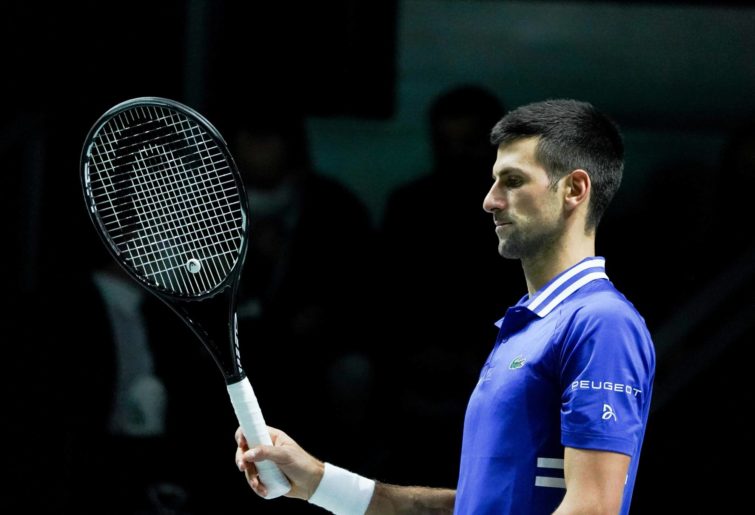Novak Djokovic tested positive to COVID-19 on December 16, less than a month before he travelled to Melbourne to compete in the Australian Open, court documents released Saturday reveal.
As the world No.1 remained in immigration detention on Saturday, the Federal Court released an online file outlining the details of his legal battle to remain in Australia.
“Mr Djokovic had received, on 30 December 2021, a letter from the Chief Medical Officer of Tennis Australia recording that he had been provided with a ‘medical exemption from COVID vaccination’ on the ground that he had recently recovered from COVID,” the documents read.
“The date of the first positive COVID PCR test was recorded on 16 December 2021.”
The papers went on to outline that Djokovic had no recent fever or respiratory symptoms of COVID-19 a fortnight after his diagnosis.
One of the documents outlined an interview between Djokovic and the Australia Border Force. A partial transcript of that interview included “you have stated you are not vaccinated against COVID-19”.
When the 34-year-old Serb landed in Melbourne late on Wednesday, he was detained and questioned before his visa was revoked and the tennis star was taken to immigration detention.
Djokovic’s matter is due back in court on Monday when lawyers will attempt to overturn the federal government’s deportation order.
On Friday Serbia’s foreign affairs ministry hit out at Australia’s decision to cancel Djokovic’s visa, saying the star was the victim of a political game.

(Photo by Oscar Gonzalez/NurPhoto via Getty Images)
In a statement, Serbian state secretary Nemanja Starovic said the Serbian government did not want to influence the upcoming court case in Australia but wanted Djokovic to be moved to better accommodation in the meantime.
Djokovic is staying at the Park Hotel in Melbourne’s inner north, known for housing refugees flown from Manus Island and Nauru.
“The Serbian public has a strong impression that Djokovic is a victim of a political game against his will, and that he was lured to travel to Australia in order to be humiliated,” the ministry statement said.
“Novak Djokovic is not a criminal, terrorist or illegal migrant, but he was treated that way by the Australian authorities, which causes understandable indignation of his fans and citizens of Serbia.”
Home Affairs Minister Karen Andrews said Djokovic was not being held captive in Australia.
“He is free to leave at any time that he chooses to do so, and Border Force will facilitate that,” she told ABC News.
Meanwhile, Djokovic will emerge from his hell-hole stint in quarantine and be back to peak physical condition within a matter of days.
That’s the belief of Djokovic’s former Australian strategist Craig O’Shannessy, who has no doubt the world No.1 can contend for a 10th Australian Open crown starting January 17 if he wins his Federal Court case.
That’s a big if, of course, but it’s not out of the question.
Djokovic is challenging the Australian government’s decision to cancel his visa, applying for a judicial review and also seeking to have officials barred from deporting him in the meantime.
The case resumes at 10am on Monday and, if his legal team pull off victory, Djokovic could conceivably be released from detention as early as Monday afternoon.
But it’s hard to imagine what type of state the 20-times grand slam champion will be in.
Djokovic would have endured arguably the most stressful four nights of his life in the Park Hotel in Carlton, which has a chequered history to say the least.
For more than a year, the facility has housed detainees flown to Australia from Manus Island and Nauru for urgent medical care under now-defunct Medevac laws.
There was a COVID-19 outbreak at the hotel in October, with at least 22 of the 46 refugees and asylum seekers testing positive.
Just two weeks ago, two fires broke out on the third and fourth floors with one person taken to hospital for smoke inhalation and police saying a staff member was assaulted.
And less than a fortnight ago, asylum seekers posted images to social media showing food they had been served allegedly filled with maggots alongside mouldy pieces of bread.
O’Shannessy, though, said if there was any athlete in the world who could survive such an ordeal it was Djokovic, who the US-based Australian coach and analyst helped guide to four of his slams in 2017 and 2018.
“Novak is one of the most supreme athletes on the planet,” O’Shannessy told AAP on Saturday.
“It’s only a few days. If he wins the court case, it will only take him two days or so to hit top speed. He could be back to his peak by, say, next Wednesday or Thursday.”
While acknowledging the incredible mental strain the experience would be having on Djokovic, O’Shannessy likened the Serb’s experience, physically at least, to carrying a small injury.
“It’s like when a player can’t hit for a few days. It happens. He’s fit enough for it not to be a problem,” he said.
Now in Australian Alexei Popyrin’s corner, O’Shannessy said how Djokovic handled the whole ordeal emotionally was anyone’s guess.
“But we’ve seen over and over during his career how strong mentally Novak is,” he said.
“If there’s an athlete on the planet who could overcome all this and compete at a grand slam, it’s Novak Djokovic.
“It could even steel him.”
© AAP





























































































